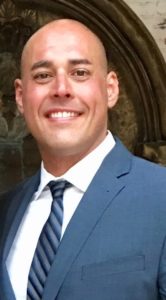
“To this day, 18 years later, I can drive down Woodruff and Spring Streets and see the image of a 1-year-old who was shot by his father. Every single day, that image from 18 years ago is still in my head. And I’ve learned that’s normal.”
Jason Cash is our 2 millionth Mental Health First Aider. He was recently trained in Mental Health First Aid for Fire and EMS and uses what he learned in his training to take care of his own mental health and help those around him.
He, like many of us, faces heartbreak and stress every day and is learning to cope with it in a healthy way.
“I use ALGEE in every conversation that I have, whether it’s with people experiencing homelessness, other first responders or friends and family. It’s part of my life now,” he said.
Jason joined the Long Beach Fire Department more than 14 years ago and although now he has coping mechanisms and a support system in place to help manage the challenges that comes with a high-stress job, this wasn’t always the case.
In fact, when he first graduated from the fire academy, it was the exact opposite. Every day, he worked long hours, got little sleep and faced death and destruction head-on. He wasn’t given any information on how to handle the difficult things he’d see or how to protect himself emotionally and mentally.
Jason’s career continued to grow, and with more opportunities to help his community came more stress, both professionally and personally. He faced a divorce and lost his second wife to cancer. He experienced on-the-job injuries. He struggled with addiction, depression and PTSD as a result.
“I never knew I was addicted to prescription medicine and I never knew I was addicted to alcohol. All I knew was that it stopped what was going on in my head. I had physical pain and emotional pain, but I was never aware that what I was doing was trying to take away the emotional pain from years before,” he said.
A few years later, Jason was on duty and witnessed a woman attempt suicide. He realized he was filling his cup with images of death and destruction and this situation filled it to the very top. The fire department held a debrief afterward, and for the first time in his career, Jason admitted that he wasn’t okay. He admitted that he was affected by the call and that he needed help.
Jason, like many of us, needs help sometimes. And that’s okay.
We know that first responders are more likely than members of the general public to develop behavioral health problems, including depression and PTSD, and firefighters are more likely to die by suicide than in the line of duty. We know that first responders face tragedy daily, and often don’t have the tools and resources to help themselves and those around them.
That’s where Mental Health First Aid can help. Our unique module for firefighters and first responders, Mental Health First Aid for Fire and EMS, teaches strategies to better assess and access support for this critical population and how they can also help community members.
Jason uses the Mental Health First Aid ALGEE Action Plan every day to help those around him. As a member of the Long Beach Fire Department Homelessness Education and Response Unit (HEART), he helps connect people experiencing homelessness to appropriate resources and services that they need. During each conversation, he uses the ALGEE Action Plan to listen nonjudgmentally, give reassurance and information and encourage professional and self-help.
There are now 2 million people across the country trained in Mental Health First Aid. That’s 2 million people who have the skills to identify and respond to mental health and substance use challenges and crises in their communities.
We thank you for being part of the 2 million. If you’re not trained yet, take a Mental Health First Aid course today. Join Jason and others who are using their training to support one another and make a difference in their communities.